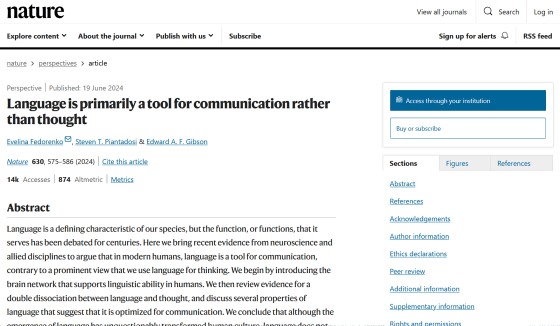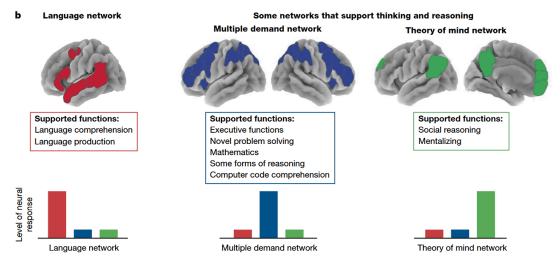Researcher argues that 'language is a tool for communication rather than for thought'

Language is one of the things that characterize human existence, but there is debate about its function: whether it is a 'tool for thinking' or a 'tool for communication.' In a paper published in the scientific journal Nature on June 19, 2024, researchers concluded that 'language is a tool for communication.'
Language is primarily a tool for communication rather than thought | Nature

Researchers from the Massachusetts Institute of Technology and the University of California, San Luis, argue that although it is difficult to draw any conclusions about the evolutionary origins of language, it is possible to consider the function of language in modern humans. Referring to the results of various past studies, they discuss whether language is a 'tool for thinking' or a 'tool for communication.'
The researchers point out that if language is a tool for thinking, then some forms of thinking and reasoning would be impossible without it, whereas if language is a tool for communication, then language should have characteristics that are beneficial for 'efficient information transmission.'
In the diagram below, the left (red) shows the areas of the human brain related to the language network, while the center (blue) and right (green) show the areas related to the networks that support thinking and reasoning. As you can see, the networks that are activated during linguistic processing are different from those that are activated during thinking and reasoning.

Of course, knowledge of words, syntactic structures, and non-linguistic symbols can facilitate certain cognitive tasks, but language does not necessarily equal thought, the researchers argue.
Evidence for this comes from past studies investigating the cognitive function of people with language disorders. According to the researchers, there are many cases showing that many forms of thought are preserved even in people with severe language disorders that affect both vocabulary and syntactic ability. This suggests that people with severe language disorders are not incapable of thinking or reasoning, but simply unable to translate these thoughts into linguistic expressions.
The researchers also say that studies using tools such as fMRI to examine the response of brain networks to non-linguistic stimuli and tasks have confirmed that the language network is silent during some thinking and reasoning.

Another source of evidence is research on the development of children who are deaf and cannot hear. If a child is deaf and their parents or caregivers are hearing and do not know sign language, the child may grow up without exposure to language for many years after birth. Past research has shown that even in such cases, children can develop complex cognitive functions, and researchers argue that language and thinking develop in parallel, rather than a child needing language to grow up.
Furthermore, even if a person's language ability is intact, there are cases where the thinking and reasoning abilities are impaired due to traumatic brain damage or mental illness, etc. In other words, having an intact language system does not necessarily guarantee perfect thinking and reasoning abilities.
The researchers say that an effective communication tool needs to be easy to produce and understand, while at the same time being robust to noise from the environment or processing mechanisms. Human language has these qualities at all levels: sounds, words, and syntax. These features, which appear across languages, would not be as likely to develop if language were primarily used for internal thought.

Based on these points, the researchers argue that language is unlikely to be an important basis for thought, and that language is a 'tool for communication. 'Taking all of this evidence into account, we have argued that language primarily serves a communicative function, rather than generating sophisticated cognition in humans. Instead of providing an important basis for thought and reasoning, it is more likely that language transformed our species by enabling the transgenerational transmission of acquired knowledge.
Related Posts:
in Science, Posted by log1h_ik







